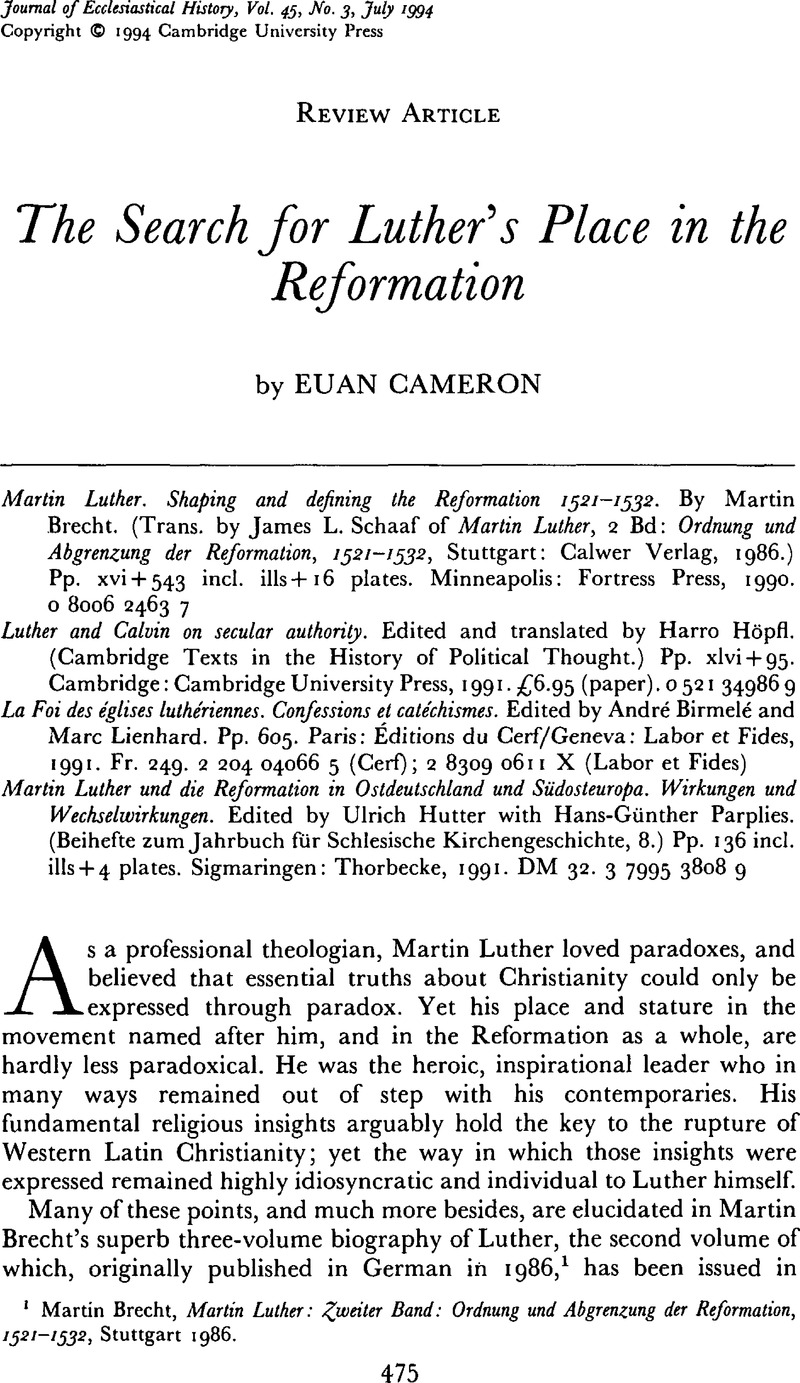No CrossRef data available.
Article contents
The Search for Luther's Place in the Reformation
Published online by Cambridge University Press: 06 February 2009
Abstract

- Type
- Review Article
- Information
- Copyright
- Copyright © Cambridge University Press 1994
References
2 Idem, Martin Luther: Driller Band: die Erhaltung der Kirche 1532–1546, Stuttgart 1987.
3 Idem, Martin Luther: his road to Reformation 1483–1521, trans. James L. Schaaf, Philadelphia 1985, p. xii.
4 In translation Boehmer, H., Martin Luther: road to Reformation, trans. Doberstein, J. W. and Tappert, T. G., Philadelphia 1946Google Scholar.
5 Bornkamm, H., (ed. Bornkamm, K.), Martin Luther in der Mittes seines Leben, Gӧttingen 1979Google Scholar; Eng. trans. Luther in midncareer 1521–1530, trans. Bachmann, E. T., London 1983Google Scholar.
6 Brecht, Luther: shaping and defining, 33ff.
7 Ibid. 251–7.
8 Ibid. 168ff, cf. 320–1.
9 Ibid. 322.
10 Compare Oberman, H. A., Luther: Mensch zwischen Gott und Teufel, Berlin 1982Google Scholar; Eng. trans. Luther; man between God and the devil, New Haven–London 1990Google Scholar.
11 Brecht, , Luther: shaping and defining, 299Google Scholar.
12 Ibid. 319.
13 Ibid. 157, 178, 184n5.
14 Ibid. 167, 293
15 Ibid. 358ff.
16 Ibid. 347ff.
17 See La Foi des églises luthériennes, 274.
18 Brecht, , Luther: shaping and defining, 117–19, 338–9Google Scholar.
19 Ibid. 382–3.
20 Ibid. 287ff; 433ff; cf. Collinson, P., The religion of Protestants: the Church in English society 1559–1625, Oxford 1982, 201ffGoogle Scholar.
21 Brecht, , Luther: shaping and defining, 255, cf. 292Google Scholar; cf. E.Cameron, ‘The “Godly Community” in the theory and practice of the European Reformation’, in Sheils, W. J. and Woods, D. (eds), Voluntary religion (Studies in Church History xxiii, 1986), 131–53Google Scholar.
22 Cf. Brecht, , Luther: shaping and defining, 324Google Scholar.
23 Ibid. 204–11.
24 Ibid. 378–9. 395f
25 See, for example, Boyle, M. O'R., Rhetoric and reform: Erasmus's civil dispute with Luther, Cambridge, Mass. 1983CrossRefGoogle Scholar.
26 See Brecht, , Luther: shaping and defining, 349ffGoogle Scholar, chs iii, xii passim.
27 Ibid, for example, 226ff, 244–50.
28 Ibid. 404.
29 Ozmen, S. E.The Reformation in the cities: the appeal of Protestantism to sixteenth–century Germany and Switzerland, New Haven, Conn.–London 1975, 216 n. 73Google Scholar (with refs to earlier literature on the topic); Thompson, W. D. J. Cargill, ‘The “Two Kingdoms” and the “Two Regiments”: some problems of Luther's Zwei–Reiche–Lehre’', in his Studies in the Reformation: Luther to Hooker, ed. Dugmore, C. W., London 1980, 42–59Google Scholar, and The political thought of Martin Luther, London 1984, 35–61Google Scholar; Iserloh, E. and Miiller, G. (eds), Luther unddie polilische Well, Stuttgart 1984, esp. pp. 3–34Google Scholar.
30 Brecht, , Luther: shaping and defining, 117–19Google Scholar.
31 Luther and Calvin on secular authority, 3–22.
32 Ibid. 22–34
33 Ibid. 34–43.
34 Luther, M., Werke: Kritische Gesamlausgabe, Weimar 1883–1948, viii. 53ffGoogle Scholar;Luther's works, ed. Pelikan, J. and Lehmann, H. T., Philadelphia–St Louis, 1955 –, xxxii. 161ffGoogle Scholar; cf. Calvin, , Institutes 11. vii. 3–5Google Scholar.
35 See, for example, Luther, , Werke, viii. 107Google Scholar; Luther's works, xxxii. 229; Calvin, , Inst. III iii. 11Google Scholar.
36 Thompson, Cargill, Political thought of Martin Luther, 58–9Google Scholar; Luther and Calvin on secular authority, 10 n. 15.
37 Brecht, , Luther: shaping and defining, 434Google Scholar, summarising sermons in Luther, , Werke, xxxii. 299–544Google Scholar.
38 Luther and Calvin on secular authority, 47–84.
39 Ibid. 48.
40 Ibid. 70.
41 Calvin: on God and political duty, ed. McNeill, John T., Indianapolis 1950, 2nd edn. 1956Google Scholar. This includes extracts from Calvin's commentaries on Romans and Daniel.
42 Die Bekenntnisschriften der evangelisch–lutherischen Kirche, herausgegeben im Gedenkjahr des Augsburgischen Konfession 1930, Gӧttingen 1930Google Scholar, and subsequently; most recent edition 1986.
43 La Foi des églises luthériennes, 251–2.
44 Pettegree, A. (ed.), The early Reformation in Europe, Cambridge 1992CrossRefGoogle Scholar, esp. ch. ii, on Bohemia, Moravia and Austria, by Winfried Eberhard, and ch iii, on Hungary, by David P. Daniel.


